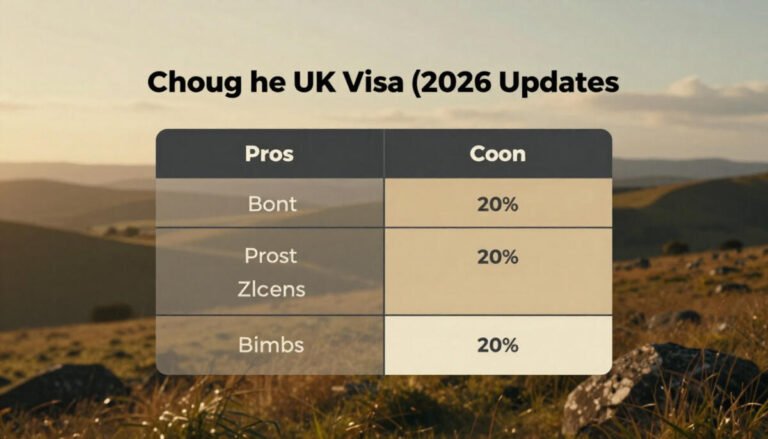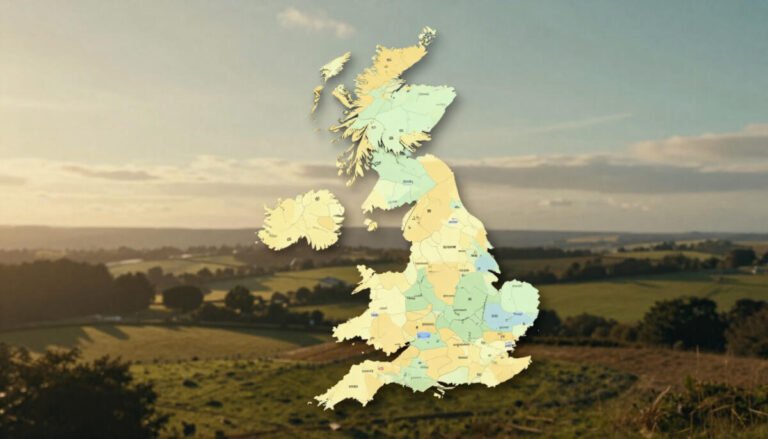Dreaming of starting a new chapter in the UK? Whether you’re drawn by career opportunities, academic goals, or simply the British lifestyle, relocating to the United Kingdom can be an exciting but complex process. In this 2026 guide, I’ll walk you through everything you need to know—from choosing the right visa to finding a job and securing a place to live. Let’s make your UK move smoother, smarter, and stress-free.
1. Choosing the Right UK Visa (2026 Updates)

Before packing your bags, the first step is securing the right visa. The UK offers multiple visa types depending on your purpose of stay:
Skilled Worker Visa (Most Common Route for Jobs)
This is ideal if you’ve been offered a job by a UK employer who holds a sponsor licence.
Requirements:
A confirmed job offer in an eligible occupation.
Minimum salary threshold (typically £26,200/year or £10.75/hour).
English language proficiency (CEFR B1 level).
- Processing Time: Usually 3–8 weeks.
- More Info: UK Skilled Worker Visa – GOV.UK
🎓 Student Visa
Perfect for those planning to study at a UK university, college, or school.
Requirements:
Offer letter from a licensed student sponsor.
Proof of funds to support yourself.
English language proof.
- More Info: UK Student Visa – GOV.UK
Graduate Visa (Post-Study Work)
If you finish a degree in the UK, this visa allows you to stay and work for up to 2 years.
Family Visa
If your spouse, fiancé, or parent is a UK citizen or resident, you may be eligible for a family visa.
2. Finding a Job in the UK (High-Demand Sectors in 2026)

Landing a job offer is often key to getting a visa. These industries are in high demand in 2026:
| Sector | Example Roles | Average Salary (2026) |
|---|---|---|
| Healthcare | Nurses, Care Workers, Doctors | £28K–£65K |
| Tech & IT | Software Engineers, Analysts | £35K–£90K |
| Engineering | Civil, Mechanical, Electrical | £30K–£70K |
| Education | Teachers (Math, Science, SEN) | £28K–£50K |
| Hospitality | Chefs, Hotel Managers | £22K–£40K |
Where to Look for Jobs:
NHS Jobs – for healthcare roles
- Tip: Filter for jobs offering visa sponsorship. In your cover letter, highlight your right to work and readiness to relocate.
3. Housing in the UK (Renting vs. Buying)

Renting (Most Common for Newcomers)
Where to find rentals:
Average Monthly Rent in 2025:
London: £1,600 – £2,500 (1-bedroom flat)
Manchester: £950 – £1,400
Birmingham: £850 – £1,300
Edinburgh: £950 – £1,400
- You’ll Need:
1 month’s deposit + 1 month’s rent upfront
Proof of income or job offer
Credit and background check (may vary for internationals)
Buying Property
Foreigners can buy property in the UK, but getting a mortgage can be tricky without UK credit history. Many prefer to rent first, build a financial profile, then buy.
4. Budgeting & Cost of Living in the UK

Living costs vary greatly depending on the city. Here’s a quick snapshot of average monthly expenses (outside rent):
| Expense | Average Cost (Single Person) |
|---|---|
| Groceries | £200–£300 |
| Transport (Oyster/Buses) | £60–£150 |
| Utilities (Gas, Water, Electric) | £100–£160 |
| Internet & Mobile | £30–£50 |
| Council Tax | £80–£150 |
- Pro Tip: Use Numbeo to compare living costs between UK cities.
5. Healthcare and Insurance

The UK has a world-class healthcare system known as the NHS (National Health Service). If you’re on a long-term visa (6+ months), you must pay the Immigration Health Surcharge (IHS) when applying for your visa.
Cost: £1,035/year for adults (as of 2025)
This gives you free access to NHS services, including GP visits, hospital care, and prescriptions.
- More Info: NHS and IHS Guide – GOV.UK
6. Opening a UK Bank Account

Setting up a bank account early helps with salary deposits, rent, and bills.
Top Banks for New Arrivals:
Monzo (great mobile app, no branches)
Barclays
HSBC UK
Lloyds
- You’ll usually need:
Passport and visa
UK address proof (tenancy agreement or utility bill)
Some banks allow account setup from abroad or with limited documentation. You can also start with a multi-currency app like Wise or Revolut.
7. Adjusting to UK Life (Culture, Weather & More)

Weather: Bring layers. Winters are damp, not freezing. Summers are mild.
Transport: Public transport is excellent in major cities. Consider an Oyster Card (London) or a railcard.
Social Norms: Brits are polite but private. Queueing is a big deal. Saying “please” and “thank you” goes a long way.
Language Tip: Even native English speakers may find British slang amusing—“loo” (toilet), “cheers” (thanks), “mate” (friend).
Final Tips for a Smooth Move
- Double-check your visa expiration dates
- Start job and housing searches before arrival
- Build credit by using UK debit or credit cards responsibly
- Join expat groups on Facebook or Meetup
- Stay informed through GOV.UK’s Moving to the UK Guide
Conclusion
Moving to the UK in 2026 can be life-changing—but planning is everything. With the right visa, job strategy, and housing know-how, you’ll settle in faster and enjoy all that the UK has to offer—from fish & chips to career growth. Bookmark this guide and come back to it whenever you need a refresher.
If you’ve made the move recently, I’d love to hear your experience in the comments below!
Frequently Asked Questions
1. What is the easiest way to move to the UK in 2026?
The Skilled Worker Visa is the most common route if you have a job offer from a UK sponsor.
2. Can I move to the UK without a job?
Yes, if you’re a student, joining family, or have independent income. But most visas require proof of purpose or sponsorship.
3. How much money do I need to move to the UK?
You’ll typically need £2,000–£4,000 upfront for visa fees, deposits, and living costs.
4. Can foreigners rent property in the UK?
Yes, but you’ll need a visa, proof of income, and sometimes a UK guarantor.
5. Do I get free healthcare in the UK?
Yes, after paying the Immigration Health Surcharge (IHS) with your visa, you can access NHS services.
6. Can I bring my family to the UK?
Yes, if your visa type allows dependents (e.g., Skilled Worker or Student visas).




